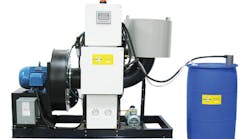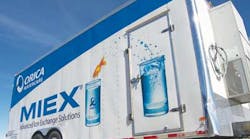I recently had the pleasure of attending the 90th annual meeting of the Water & Wastewater Equipment Manufacturers Association, where I heard a variety of knowledgeable industry experts talk about the state of the water/wastewater industry in the United States and around the world.
The growing trend for municipalities to engage in public/private partnerships was a major topic of discussion. Equipment manufacturers and suppliers are very interested in the trend and how it might impact the way they sell products to the municipal market. Selling to a privately operated company can be quite different from selling to a government entity.
Featured guest speakers on the topic included William Reinhardt, publisher of Public Works Financing; Paul Eisenhardt, senior VP for Malcom Pirnie; and Douglas Herbst, Senior VP for EarthTech Inc.
According to Reinhardt, there has been an explosion of long-term municipal contracts for full-service water and wastewater operations since January 1997, when the Internal Revenue Service adopted new rules allowing local governments to sign service contracts for as long as 20 years without giving up the federal tax subsidy on their bond-financed facilities.
He noted that 55 requests for proposals (RFPs) in 1997 ended in signed municipal contracts, adding $50 million a year in gross revenues to the annual contract operations base of about $1.1 billion annually.
The 14 largest firms in the industry provided contract operations services in 1997 to more than 1,200 facilities for 775 different municipalities. That figure includes 736 wastewater treatment plants and 464 drinking water plants, with a combined capacity of 4,673 mgd design capacity.
While long-term operations agreements are growing, the concept of actually selling a facility seems to be losing favor. Birmingham voters recently rejected a move to sell the water system there, and the city leadership is now looking to other options, which could include some form of long-term operating agreement.
Municipalities are also interested in bundling of services, according to Herbst, who expects a rapid growth in design/build/operate partnerships.
In a round table discussion about marketing equipment and technology to the municipal industry, WWEMA members agreed that public/private partnerships could have a significant impact on the way equipment is purchased. Private operations companies are more inclined to sole-source equipment and have shorter purchasing cycles. They also tend to buy higher quality equipment, turning away from low-bid buying and focusing instead on life-cycle costs.
Privatization could also change the role of the consulting engineer as specifier, and the company rep as merely a salesman. In the future, equipment marketers hope to work more directly with facility owners or operators, and expect that companies will be called on to provide greater technical and logistical support for their products, beyond the sale.
Although the movement toward public/private partnerships is growing rapidly, only a small part of the market has been privatized. The influence of the movement has spread far beyond the actual number of contracts signed, however. The concept of competition and operating a public utility like a private business is growing at an even more rapid pace.
That more than anything may change the face of the water/wastewater industry in the years to come.

